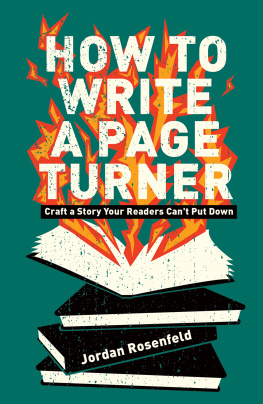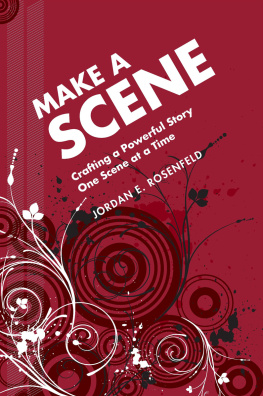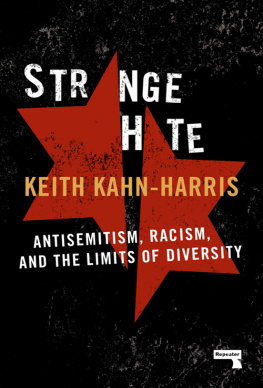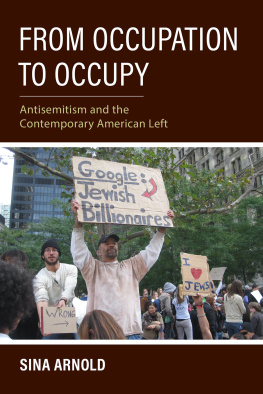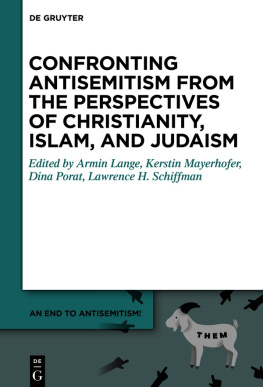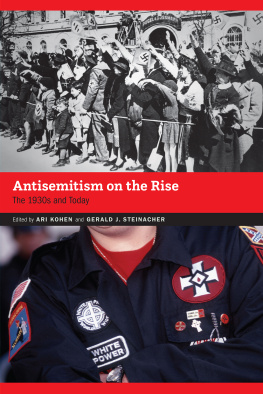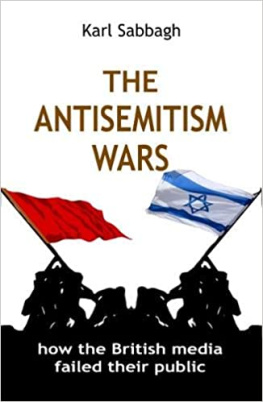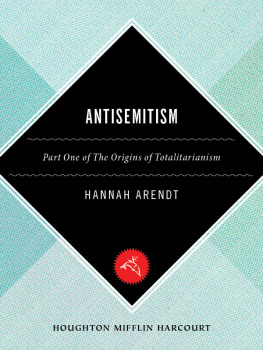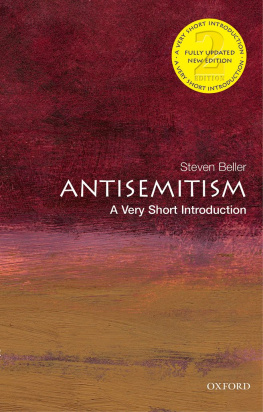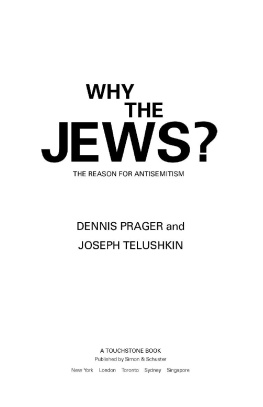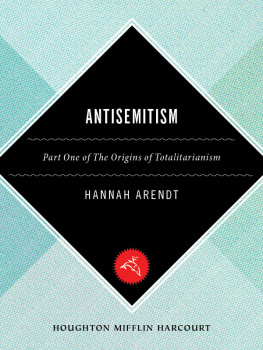DECIPHERING THE NEW
ANTISEMITISM
STUDIES IN ANTISEMITISM
Alvin H. Rosenfeld
DECIPHERING THE NEW
ANTISEMITISM

EDITED BY
ALVIN H. ROSENFELD

This book is a publication of
Indiana University Press
Office of Scholarly Publishing
Herman B Wells Library 350
1320 East 10th Street
Bloomington, Indiana 47405 USA
iupress.indiana.edu
2015 by Indiana University Press
All rights reserved
No part of this book may be reproduced or utilized in any form or by any means, electronic or mechanical, including photocopying and recording, or by any information storage and retrieval system, without permission in writing from the publisher. The Association of American University Presses Resolution on Permissions constitutes the only exception to this prohibition.
The paper used in this publication meets the minimum requirements of the American National Standard for Information SciencesPermanence of Paper for Printed Library Materials, ANSI Z39.48-1992.
Manufactured in the United States of America
Library in Congress Cataloging-in-Publication Data
Deciphering the new antisemitism / edited by Alvin H. Rosenfeld.
pages cm. (Studies in antisemitism)
Includes index.
ISBN 978-0-253-01865-6 (cloth : alk. paper) ISBN 978-0-253-01869-4 (ebook) 1. AntisemitismHistory21st centuryCongresses. 2. AntisemitismCongresses. I. Rosenfeld, Alvin H. (Alvin Hirsch), [date]- editor.
DS145.D435 2016
305.8924dc23
2015020756
1 2 3 4 5 20 19 18 17 16 15
For Diane Druck
With Gratitude and in Friendship
Contents
/ Alvin H. Rosenfeld
/ Pascal Bruckner
/ Kenneth L. Marcus
/ Gnther Jikeli
/ Elhanan Yakira
/ Doron Ben-Atar
/ Jean Axelrad Cahan
/ Bruno Chaouat
/ Eirik Eiglad
/ Mark Weitzman
/ Bernard Harrison
/ David Patterson
/ Aryeh Tuchman
/ Sina Arnold
/ R. Amy Elman
/ Aleksandra Gliszczynska-Grabias
/ Stephan Grigat
/ Bodo Kahmann
/ Matthias Kntzel
Acknowledgments
UNDER THE AUSPICES OF Indiana Universitys Institute for the Study of Contemporary Antisemitism (ISCA), forty-five scholars from ten countries came together in Bloomington in April 2014 for four days of intensive analysis and discussion of the recent upsurge of anti-Jewish hostility. The chapters of this book are revised versions of many of the papers presented at this gathering, the second international scholars conference on antisemitism that ISCA has convened.
I thank all of the conference participants for their important critical insights into the challenging subject matter before us and for the exceptional display of collegiality that marked our deliberations. I am grateful to Ira Forman, the U.S. State Departments special envoy to combat and monitor antisemitism, who spoke to conference participants and especially invited guests about his work on the evening before our sessions formally began.
I am particularly grateful to M. Alison Hunt, who was invaluable in more ways than one in helping me organize the conference and prepare many of the conference papers for subsequent publication. I can hardly thank Alison enough for being such a congenial and efficient coworkera pleasure to have by my side from start to finish.
Special thanks likewise go to Janet Rabinowitch for carefully reading and editing all of the books chapters. Janets professional expertise as an editor is of the highest order and is matched by her personal graciousness and generosity. I am hugely appreciative of all her efforts on this volumes behalf.
I also thank Melissa Deckard, Janice Hurtuk, Tracy Richardson, and Melissa Hunt for their steadfast assistance in helping with a range of conference-related details.
My deepest gratitude goes to the following benefactors, whose generosity, in addition to being of direct practical help, is the best vote of confidence in our work that I could possibly hope for: the Justin M. Druck Family (sponsoring benefactor), Hart and Simona Hasten, David Semmel and Jocelyn Bowie, Monique Stolnitz, Tom Kramer, Marija Krupoves-Berg and Dr. Daniel Berg, Irwin Broh, Gale Nichols, Roger and Claudette Temam, and Carole Silverstein and Dr. Bruce Silverstein.

Few undertakings are more dispiriting for scholars than the study of antisemitism. For lifting the hearts and strengthening the resolve of conference participants, it is a pleasure to acknowledge the special contributions of Marija Krupoves-Berg, Daniel Stein, Svetla Vladeva, Dena El Saffar, and Tim Moore, whose inspired performances of Jewish music helped us through some difficult days.
Finally, I am most grateful to President Michael McRobbie, Provost Lauren Robel, and dean of the College of Arts and Sciences Larry Singell for their support of the work of the Institute for the Study of Contemporary Antisemitism. Indiana University is one of only two institutes of higher learning in the United States that houses a research institute of this kind. It is both a privilege and a pleasure to work at a university whose administrative leadership is as understanding, cooperative, and supportive of such new initiatives as these distinguished colleagues are.
Alvin H. Rosenfeld
DECIPHERING THE NEW
ANTISEMITISM

Introduction
ALVIN H. ROSENFELD
THIS BOOK ADDRESSES a disturbing phenomenon that was largely unforeseen in the recent past but has since grown to be one of the most highly charged developments of our time: the upsurge of antisemitism on a global scale. Such hostility has increased significantly since the end of the previous century, and while it takes a variety of forms and poses different challenges in different parts of the world, it is always a threat and needs to be taken seriouslyand not only by Jews. This latter point was made clear in a brief but telling statement issued in July 2014 by the foreign ministers of France, Germany, and Italy. They condemned the anti-Semitic rhetoric and hostility towards Jews [and] attacks on people of the Jewish faith and synagogues that were taking place almost daily in their countries and elsewhere in Europe. Recognizing the ominous nature of these occurrences, they pledged to do everything we can to ensure that our citizens can continue to live in peace and security, free from anti-Semitic hostility.and timely. It was also politically wise, for it is well-known that the pathologies that animate antisemitism do not focus their destructive energies only on Jews but, if left unchecked, inevitably end up targeting others, as well, and can create high levels of social chaos and disruption.
Jonathan Sacks, the former chief rabbi of Great Britain, expanded on this latter point in these terms: Antisemitism has been the early warning signal of a society in danger.... The politics of hate that begins with Jews never ends with Jews.... Ultimately, this campaign amounts to an attack on Western democratic freedoms as a whole. If not halted now, it will be Europe itself that will be pushed back to the Dark Ages.
Next page


